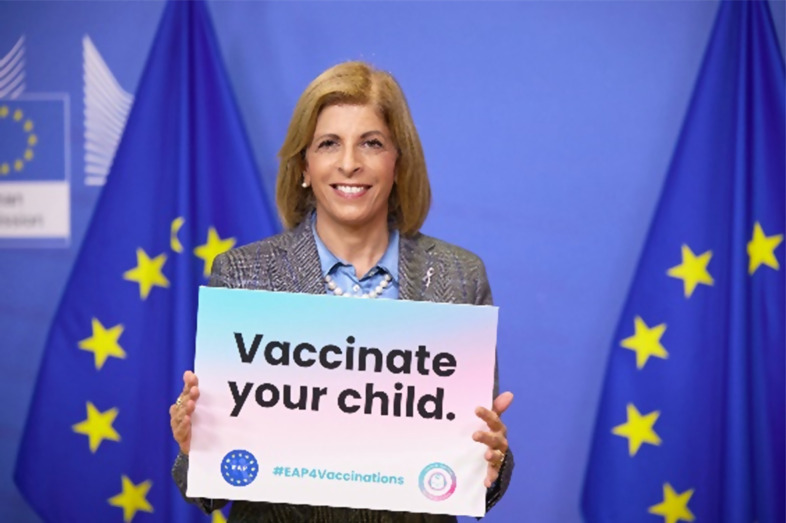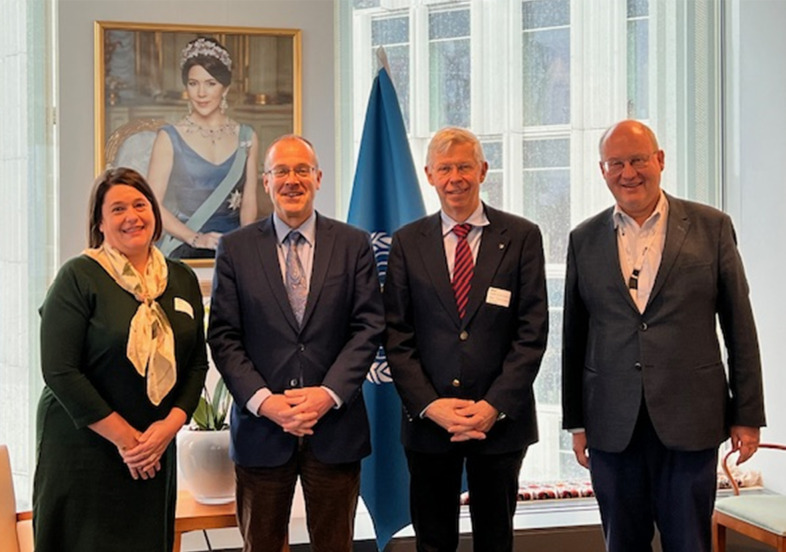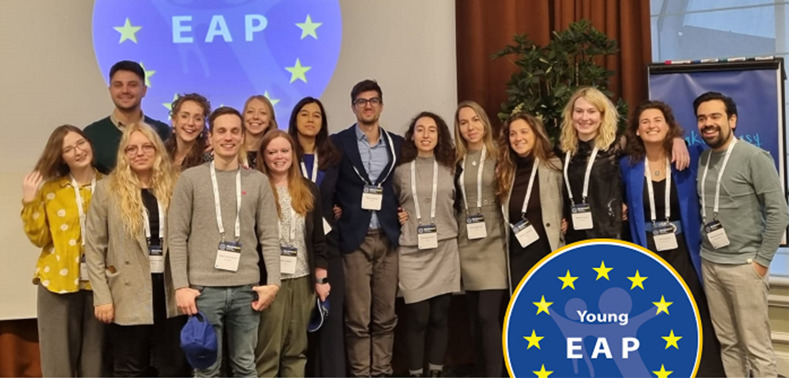The European Academy of Paediatrics (EAP) is the united pan-European voice of Paediatrics and Child Health, representing 52 national paediatric societies across Europe, including also the Turkish Pediatric Association, and 14 European paediatric subspecialty societies, in close collaboration with a further 14 affiliated societies dedicated to Child Health. We act on behalf of and in the interest of our member societies, of paediatricians, and the mission to support and protect the health and well-being of children.
The organization was created in 1961 as the Confederation of European Specialists in Paediatrics (CESP) with the key goal to promote the quality of care given to children. Among the key topics addressed were inter alia paediatrician’s training, Continuing Medical Education, collaboration of paediatricians with general practitioners and other medical specialists, preventive paediatrics, school medicine, perinatal care and care for handicapped child, and the definition of paediatrics as “Child and Adolescent Medicine”. Through the creation of the European Board of Paediatrics in 1993, the EAP has assumed responsibility for developing updated and new European Training Requirements (ETR) in Paediatrics and Paediatric Subspecialities, and for facilitating their adoption by the Union of European Medical Specialists (UEMS). Thereby, the paediatric ETRs are binding standards in the European Union member states, and they also guide national training standards in many other countries across Europe and beyond.
While delegates from countries outside of the European Union were involved in the EAP for a long time, a revision of the statutes adopted in 2020 has opened full and equal membership to the National Paediatric Organisations of all countries in the European Region of the World Health Organisation. Membership is also offered to European societies representing a paediatric subspecialty. Of importance, all individuals that are members of associations who joined the EAP are considered “EAP Fellows” and can participate in the EAP activities.
Annual European Board of Paediatrics Examination and Core Knowledge in Paediatrics Course
The European Board Examination offered yearly (this year on November 19, 2024) provides an opportunity to evaluate one’s knowledge in Core Paediatrics and to identify gaps, and it can complement paediatic board examinations. The Exam is preceded by an online Core Knowledge in Paediatrics Course in October. Information on the offer in 2024 will become available in due course on the EAP website (https://www.eapaediatrics.eu/).
Qualified experts invited to join the EAP Strategic Advisory Groups
EAP’s Strategic Advisory Groups (SAGs) develop joint position papers on key issues that reflect the joint position of European paediatrics and serve as the basis for our advocacy activities. Any members of our member societies may be appointed as a contributing member of our SAGs. The SAGs usually work via online meetings, and at times 1-2 face meetings per year. We are looking for qualified experts that are capable and willing to contribute in their respective area of expertise. The topics of our current SAGs include Adolescent Health, Choosing Wisely, Ethics, Migrant Children’s Health, Medicines for Children, Rare Diseases, and Vaccination. It has also been considered to form new SAGs on Climate Change and Child Health, Research for Children, and Diversity and inclusion in pediatrics. If you can contribute please write an email indicating your interest to eapsecretariat@eapaediatrics.com with an attached brief biosketch showing your experience in the respective area.
Improving vaccination rates in children and adolescents
EAP participated in several European Union funded collaborative projects aiming to improve vaccine uptake, including the projects “Innovative Immunisation Hubs”, the “Coalition for Vaccination of European Healthcare Professionals” and “Reducing inequalities in vaccine uptake in the European Region”. Our campaign “Vaccinate your child” was supported i.a. by the European Commissioner for Health Stella Kyriakides and received broad attention.

Securing access of children to required medical devices
The revised European Union legislation on Medical Devices EAP has not given sufficient attention to the needs of children and of other patients with rare diseases. The requirements and costs for re-registration of devices marketed for many years, and for new devices, are so high that manufacturers tend not to register devices sold in smaller volumes where the high costs of registration cannot be recovered. As a result, essential medical devices needed for the care of sick children (e.g. devices for interventional paediatric cardiology, dialysis equipment for young children) are becoming unavailable. EAP has led the Task on paediatric devices in the EU Horizon Framework project “Coordinating Research and Evidence for Medical Devices”, performed a systematic review to evaluate the availability of clinical evidence,1 and developed und published joint recommendations with 24 organisations on the topic2 and disseminated this widely, for example at the International Medical Device Regulators Forum and political decision makers at European and national levels We also wrote an open letter demanding rapid changes with 27 associations and received a positive response letter by the President of the European Commission, Dr. Ursula von der Leyen. Consequently, constructive collaboration has evolved with the European Commissions’s Medical Device Task Force where EAP is now participating, aiming to develop solutions.
Promoting Child and Adolescent Health with the WHO Regional Office for Europe
In 2023 we published a position paper criticizing that the 5-year strategy of the WHO Regional Office for Europe did not pay attention to the needs of children and adolescents.3 We were heard, and WHO Europe agreed to develop a “European Strategy for Child and Adolescent Health and Wellbeing”. We were given the opportunity to comment and contribute. Early in December 2023 the WHO Regional Director Hans Kluge met with EAP secretary Ann de Guchtenaere and EAP president Berthold Koletzko. We agreed to proceed to establish formal collaboration in selected key areas of child and adolescent health. We are excited about this great opportunity to advance our goals jointly with WHO Europe.


The Young EAP
The Young European Academy of Paediatrics is a particularly dynamic and active group within our association. Young EAP is the network of national junior paediatric representatives, with twenty-five countries represented, and growing. Several national representatives are also involved in national junior paediatric societies and sections; as such, they bridge paediatric trainees in their country with Young EAP and provide valuable input to challenges that need to be more widely discussed. The national junior doctor representatives in Young EAP meet every month online and work jointly on projects that aim to educate, innovate or advocate in the field of child health. The network has also organised several educational webinars featuring international guest experts who share information e.g. on the future of child health and paediatric training.
Upcoming events
This year’s European Academy of Paediatrics Mastercourse is held on 12-14 April 2024 (https://eap-congress.org/) at the amazing city of Porto, Portugal. It offers an in-depth state-of-the art update on infectious diseases and vaccination.
The 10th European Academic Paediatric Societies Congreee is held on 17-20 October 2024 at Vienna, Austria (https://eaps2024.kenes.com/) and provides an overview of new development across the whole field of paediatrics.
Don’t miss these great opportunities to update you knowledge and to meet and exchange with your peers from all across the European region. We hope to see you there!
Declaration of Interests:
Berthold Koletzko is the president of the European Academy of Paediatrics and he is a member in the Editorial Board of the Turkish Archives of Pediatrics.
References
- 1. Guerlich K, Patro-Golab B, Barnacle A, et al. European expert recommendations on clinical investigation and evaluation of high-risk medical devices for children. Acta Paediatr. November 2023;112(11):2440 2448. ( 10.1111/apa.16919) [DOI] [PubMed] [Google Scholar]
- 2. Guerlich K, Patro-Golab B, Dworakowski P, et al. Evidence from clinical trials on high-risk medical devices in children: A scoping review. Pediatr Res. 2023. ( 10.1038/s41390-023-02819-4) [DOI] [PMC free article] [PubMed] [Google Scholar]
- 3. Jansen D, Brenner M, Illy K, et al. Leave no one behind: why who’s regional office for Europe should prioritise children and adolescents in their program of work. A position statement from the European academy of paediatrics. Front Pediatr. 2023;11:1184870. ( 10.3389/fped.2023.1184870) [DOI] [PMC free article] [PubMed] [Google Scholar]



 Content of this journal is licensed under a
Content of this journal is licensed under a